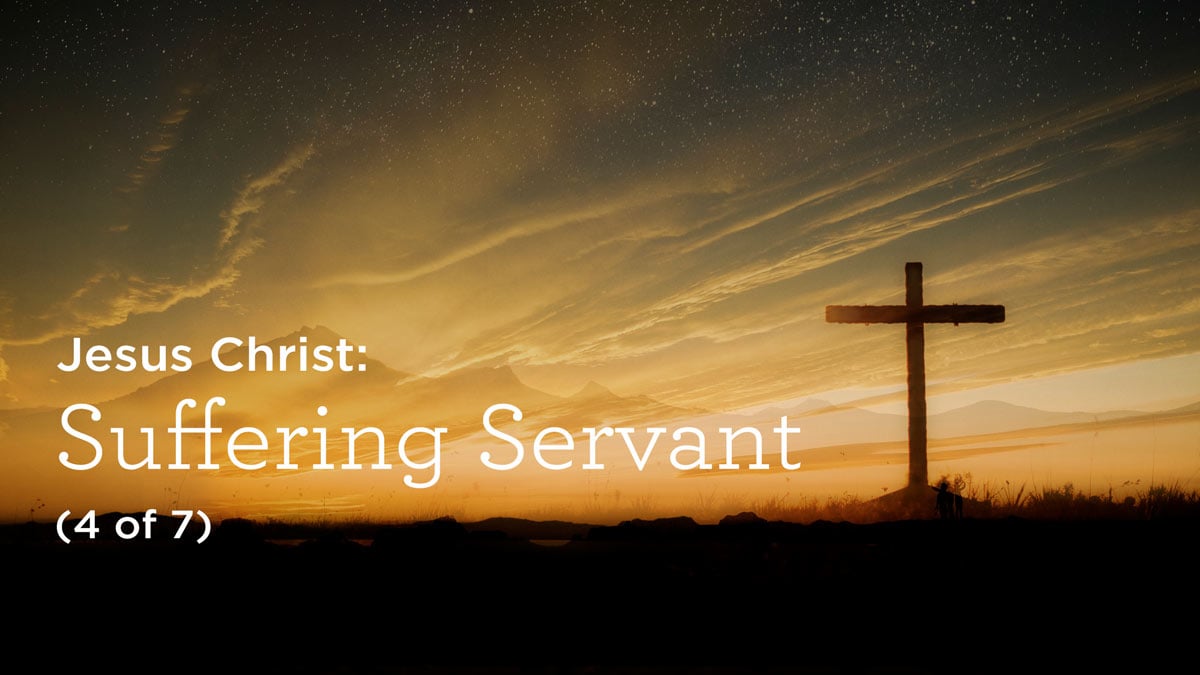
The second half of the prophecy of Isaiah is set against the dark backcloth of God’s judgment on His people and their exile in Babylon. Slowly, out of the shadow lands, a figure appears. He is described by God as “my servant,” and his presence dominates a series of poetic passages known collectively as the “Servant Songs.”
The fourth of these songs, Isaiah 52:13–53:12, is by far the best known. Here the servant appears as the Suffering Servant—a portrait that would profoundly influence the way in which the New Testament writers spoke of Jesus.
The Fourth “Servant Song”
In this passage, the servant appears first of all as a glorious figure (52:13)—but then, inexplicably, he becomes a sufferer (52:14). As the song continues, he is portrayed as “despised and rejected by men, a man of sorrows and acquainted with grief” (53:3).
This portrait of Jesus as the Suffering Servant disarms the superficial triumphalism that sadly emanates from too many Christian organizations and churches.
Then the truth begins to unfold: he is taking the place of others. He is suffering for them:
Surely he has borne our griefs
and carried our sorrows;
yet we esteemed him stricken,
smitten by God, and afflicted.
But he was wounded for our transgressions;
he was crushed for our iniquities;
upon him was the chastisement that brought us peace,
and with his stripes we are healed.
All we like sheep have gone astray,
we have turned—every one—to his own way;
and the Lord has laid on him
the iniquity of all (vv. 4–6)Yet it was the will of the Lord to crush him;
he has put him to grief;
when his soul makes an offering for sin,
he shall see his offspring; he shall prolong his days;
The will of the Lord shall prosper in his hand.
Out of the anguish of his soul he shall see and be satisfied;
by his knowledge shall the righteous one, my servant,
make many to be accounted righteous,
and he shall bear their iniquities. (vv. 10–11)
The song doesn’t end there, though. As a result of his sacrificial suffering, the servant is exalted, and the connection between his humiliation and his exaltation is explained:
Therefore I will divide him a portion with the many,
and he shall divide the spoil with the strong,
because he poured out his soul to death
and was numbered with the transgressors;
yet he bore the sin of many,
and makes intercession for the transgressors. (v. 12)
If someone had asked Isaiah, “Who were you writing about? Is it someone you know?” we can imagine his reply: “You know, I can’t say properly. I was asking these very questions myself, wondering, even trying to imagine, who this person could possibly be and how all this will unfold.”
Unlike Isaiah, we need wonder no longer. We are blessed to be able to read our Bibles from back to front—and the explanations of the New Testament help us to see how all of Scripture, including Isaiah’s prophecy, points to the Lord Jesus.
Jesus in the Garden of Gethsemane
What does it mean that Jesus was “the Suffering Servant”? To answer that question—at least in part—we need to try to follow Jesus, on the evening of His crucifixion, to the garden of Gethsemane:
And he came out and went, as was his custom, to the Mount of Olives, and the disciples followed him. And when he came to the place, he said to them, “Pray that you may not enter into temptation.” And he withdrew from them about a stone’s throw, and knelt down and prayed, saying, “Father, if you are willing, remove this cup from me. Nevertheless, not my will, but yours, be done.” And there appeared to him an angel from heaven, strengthening him. And being in agony he prayed more earnestly; and his sweat became like great drops of blood falling down to the ground. And when he rose from prayer, he came to the disciples and found them sleeping for sorrow, and he said to them, “Why are you sleeping? Rise and pray that you may not enter into temptation.” (Luke 22:39–46)
From such a prospect, the impending crucifixion surely seems to us like a horrendous mess: Jesus, the faithful Servant, is about to be crucified between two criminals on a garbage heap outside the city walls of Jerusalem—betrayed, deserted, spat upon, flogged, demeaned. How can Isaiah possibly say—however reverently—that God is in control of it all, that it “was the will of the Lord to crush him”?
Paul offers us one answer: Jesus, he says, was made a curse for us so that we might receive God’s blessing in him (Gal. 3:13). And why was He made a “curse” for us? Because “he made him to be sin who knew no sin, so that in him we might become the righteousness of God” (2 Cor. 5:21). The letter to the Hebrews also helps us: Jesus, it says, made “propitiation for the sins of the people” (Heb. 2:17); He became the sacrifice that exhausts God’s wrath against our sin.
Compassion, Commitment, and Taking Up the Cross
Seeing Jesus in Gethsemane, we are likely to have several reactions. We may find ourselves exclaiming, “What compassion is here!”—and we’d be right to do so. We may also stand in awe at His commitment: He is about to move from the theoretical—the long-held knowledge that crucifixion and the judgment of God await Him at the end of the road—to the imminent and the actual.
We should note, though, how this portrait of Jesus as the Suffering Servant disarms the superficial triumphalism that sadly emanates from too many Christian organizations and churches. We often want a Jesus who does all the suffering. But what do we find in the Gospels? This: after Jesus tells the disciples, “The Son of Man must suffer many things and be rejected by the elders and the chief priests and the scribes and be killed” (Mark 8:31), He tells them, “If anyone would come after me, let him deny himself and take up his cross and follow me. For whoever would save his life will lost it, but whoever loses his life for my sake and the gospel’s will save it” (vv. 34–35).
Yes, the servants of the Suffering Servant must suffer with Him. It is the pathway to glory. If we hear God’s voice calling us toward hardship, then, let us not harden our hearts but instead place our faith in the goodness of the one who suffered for our sake.
Truth For Life, The Bible-Teaching Ministry of Alistair Begg has adapted this content with permission from Name above All Names by Alistair Begg and Sinclair B. Ferguson (Crossway, 2013).

Other articles in this series:
Topics: Articles